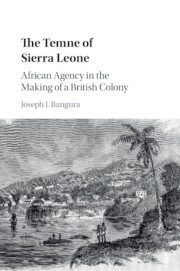Book contents
- The Temne of Sierra Leone
- The Temne of Sierra Leone
- Copyright page
- Dedication
- Contents
- List of Figures and Table
- Preface
- Acknowledgment
- List of Abbreviations
- Part I Historical Epistemology
- Part II Beyond the Colonial Sphinx: African Agency in the Making of the Colony
- Part III Ethnocentrism and New Frames of Popular Culture
- Bibliography
- Index
- References
Bibliography
Published online by Cambridge University Press: 30 October 2017
- The Temne of Sierra Leone
- The Temne of Sierra Leone
- Copyright page
- Dedication
- Contents
- List of Figures and Table
- Preface
- Acknowledgment
- List of Abbreviations
- Part I Historical Epistemology
- Part II Beyond the Colonial Sphinx: African Agency in the Making of the Colony
- Part III Ethnocentrism and New Frames of Popular Culture
- Bibliography
- Index
- References
- Type
- Chapter
- Information
- The Temne of Sierra LeoneAfrican Agency in the Making of a British Colony, pp. 197 - 210Publisher: Cambridge University PressPrint publication year: 2017



